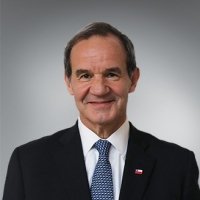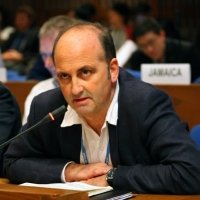Building Ocean Resilience in the Face of Climate Change
There is growing recognition of the need to rapidly implement ocean-based solutions to climate change, such as cutting emissions by ocean-based industries like shipping, and conserving “blue carbon” ecosystems that sequester emissions. Climate change also poses existential threats to the ocean that require immediate action to avoid major impacts on fisheries, marine life, and the livelihoods of billions of people worldwide.
There are several opportunities in 2021 to bolster the ocean’s resilience to climate change. For example, there is growing momentum behind a campaign to protect 30 percent of the Earth’s land and seas by 2030. Discussions are also underway in advance of the Conference of Parties to the U.N. Convention on Biological Diversity in October to ramp up global conservation efforts. Additionally, the United Nations is hosting negotiations in August on a new international treaty for the conservation and sustainable use of the high seas, which constitute two-thirds of the world’s ocean and cover nearly half the surface of our planet.
These opportunities, alongside the next U.N. Climate Summit (COP 26) in December, could signal a shifting change and greater ambition for global marine protections. To build support, several governments have organized coalitions, including the Blue Leaders, Global Ocean Alliance, and High Ambition Coalition.
Selected Quotes
Andrés Allamand
“I think that we should consider the idea of building an alliance, a coalition, specifically in terms of supporting the creation and the management of Marine Protected Areas in the world. Why is this very important? Because this is a very concrete idea that has an impact in biodiversity, in the care of the ocean, in fisheries, in everything.”
“We think also that in terms of public opinion, this is something feasible. For instance, public opinion in Chile is very in favor of Marine Protected Areas. As you know, the 43% of our jurisdictional waters are under MPAs, so they are protected. And of course, with the position of some special and local interests like fisheries and sometimes mining. But the will of the people and the support of the people in terms of this concrete initiative I think is something very important that can be replicated all around the world.”
“This idea of implementing and supporting the management of the Marine Protected Areas is a field where the international cooperation can come together.”
Haydée Rodriguez-Romero
“We here in Costa Rica—as the minister in Chile was saying—we need to start by guiding by example and here in Costa Rica we only have less than 3% of our marine territory under some protection and we want to jump from that 3% to 30% for the next year. We are going to do it by 2022.”
“We need a healthy ocean, securing a global network of these marine [protected areas] free from harmful activities can provide the ocean with a needed space to rebuild and regenerate. So, we really look forward to working with all countries who have signed up to the 30 by 30 goal to help drive forward an ambitious ocean target at the next Convention on Biological Diversity (CBD) Conference of Parties (COP) to highly and fully protect 30% of the ocean by 2030.”
“We have the responsibility to demonstrate the benefits to the communities, and in order to do that we also need to start collaborating and creating an international fund for moving in the same fast-track that we are trying to move the protection in our oceans.”
Vincent Van Quickenborne — remarks read out loud by moderator
“It has already been scientifically proven that the ocean is the first line of defense against climate change, absorbing carbon dioxide and excess heat from anthropogenic activities. If we do not safeguard our ocean, it will no longer be able to provide these life-sustaining services, so Belgium is committed to driving an ambitious and new global ocean protection target forward at the next CBD COP to protect 30% of the ocean by 2030.”
“Fully protected means that no extractive or destructive activities are allowed and highly protected means that only light extractive activities, such as subsistence or small-scale fishing with minimal impact are allowed. As has been highlighted very well by scientists, this is a critical piece of the protection puzzle, we must ensure marine protected areas are granted true protection.”
“In Belgium, for example, we have already demarcated 37% of our marine waters as Marine Protected Areas and we are currently looking at a revision of their management objectives and their management plans. We all must do our part of the job.”
Callum Roberts
“When you don’t fish animals they live longer, they grow larger, and big animals produce many, many times more offspring than small animals do and those offspring are transported on ocean currents from protected areas into surrounding fishing grounds. Protected areas are leaky across their edges, animals move out to places where they can be caught and of course wildlife thrives in places where habitats are better.”
“If we were to establish that 30% though, as highly or fully protected MPAs then we’re going to produce a much bigger uplift in the total abundance of life across the sea and that’s really important because the more life there is in the ocean the more resilience there is to climate-driven change.”
“All MPAs need a greater investment in management than is typically the case because it’s only with the support of people and communities and with good compliance and enforcement that those MPAs are going to deliver their full potential.”
Maximiliano Bello
“We took it for granted for many years. Those schools of hammerheads have been disappearing. We’ve been plummeting this species and these populations for the last fifty years.”
“This is the fight of our humanity, this is the fight of our time and I think there’s nothing better [than] to hear all of you—with the power you have—to actually make this done.”
“It’s not just the decision of the decision-makers, it’s not just at that level. But it’s how we actually involve every single one—every single one in this planet should be taking care of what gave us life.”
Waldemar Coutts
“MPAs contribute to a healthy ocean, and when we contribute to a healthy ocean we [are] also contributing to the functions that the oceans fulfill in terms of being a relevant carbon sink and a climate regulator.”
“I also wanted to stress the need to strengthen efforts to achieve this target, 30% by 2030, together with the Global Ocean Alliance, the High Ambition Coalition, Blue Leaders, and ensure that this objective is adopted by the CBD soon and the significant role that a network of MPAs is destined to play in an ambitious and strong high-seas treaty.”
Introductions

Former Acting Deputy Assistant Secretary for Oceans and Fisheries and Director for Ocean and Polar Affairs, US Department of State

Moderator

Panelists





Senior Advisor, Mission Blue

Hosted By

Latin America Program
The Wilson Center’s prestigious Latin America Program provides non-partisan expertise to a broad community of decision makers in the United States and Latin America on critical policy issues facing the Hemisphere. The Program provides insightful and actionable research for policymakers, private sector leaders, journalists, and public intellectuals in the United States and Latin America. To bridge the gap between scholarship and policy action, it fosters new inquiry, sponsors high-level public and private meetings among multiple stakeholders, and explores policy options to improve outcomes for citizens throughout the Americas. Drawing on the Wilson Center’s strength as the nation’s key non-partisan policy forum, the Program serves as a trusted source of analysis and a vital point of contact between the worlds of scholarship and action. Read more


Environmental Change and Security Program
The Environmental Change and Security Program (ECSP) explores the connections between environmental change, health, and population dynamics and their links to conflict, human insecurity, and foreign policy. Read more


Global Europe Program
The Global Europe Program is focused on Europe’s capabilities, and how it engages on critical global issues. We investigate European approaches to critical global issues. We examine Europe’s relations with Russia and Eurasia, China and the Indo-Pacific, the Middle East and Africa. Our initiatives include “Ukraine in Europe”—an examination of what it will take to make Ukraine’s European future a reality. But we also examine the role of NATO, the European Union and the OSCE, Europe’s energy security, transatlantic trade disputes, and challenges to democracy. The Global Europe Program’s staff, scholars-in-residence, and Global Fellows participate in seminars, policy study groups, and international conferences to provide analytical recommendations to policy makers and the media. Read more


Polar Institute
Since its inception in 2017, the Polar Institute has become a premier forum for discussion and policy analysis of Arctic and Antarctic issues, and is known in Washington, DC and elsewhere as the Arctic Public Square. The Institute holistically studies the central policy issues facing these regions—with an emphasis on Arctic governance, climate change, economic development, scientific research, security, and Indigenous communities—and communicates trusted analysis to policymakers and other stakeholders. Read more


